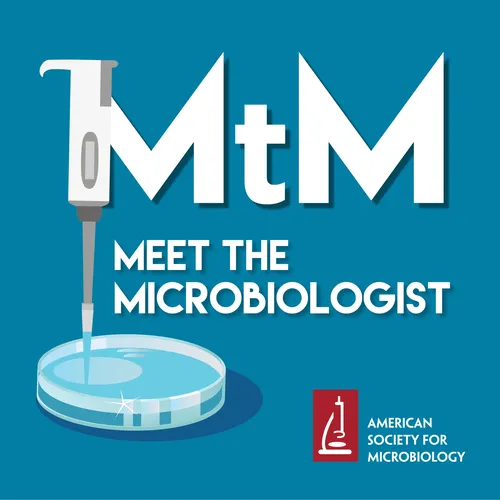
Meet the Microbiologist
Who is microbiology? Meet the Microbiologist (MTM) introduces you to the people who discover, innovate and advance the field of microbiology.
Go behind-the-scenes of the microbial sciences with experts in virology, bacteriology, mycology, parasitology and more! Share in their passion for microbes and hear about research successes and even a few setbacks in their field.
MTM covers everything from genomics, antibiotic resistance, synthetic biology, emerging infectious diseases, microbial ecology, public health, social equity, host-microbe biology, drug discovery, artificial intelligence, the microbiome and more!
From graduate students to working clinicians and emeritus professors, host, Ashley Hagen, Scientific and Digital Editor at the American Society for Microbiology, highlights professionals in all stages of their careers, gleaning wisdom, career advice and even a bit of mentorship along the way.
- Update frequency
- every 20 days
- Average duration
- 40 minutes
- Episodes
- 169
- Years Active
- 2008 - 2025

127: E. coli and Burkholderia vaccines with Alfredo Torres
Pathogenic E. coli are different than lab-grown or commensal E. coli found in the gut microbiome. Alfredo Torres describes the difference between these, the method his lab is using the develop vaccin…

126: Placental biology, infection and immunity with Carolyn Coyne
Does the fetus have a microbiome? How does the placenta prevent infection? Carolyn Coyne talks about placental structure and biology, and why studying the maternal-fetal interface remains a critical …

125: Coronavirus Antiviral Drug Discovery with Timothy Sheahan
Are there drugs that can treat coronaviruses? Timothy Sheahan talks about his drug discovery work on a compound that can inhibit all coronaviruses tested so far, and tells how his career path took h…

124: Gastroenteritis Viruses with Mary Estes
Viral gastroenteritis around the world causes 200,000 deaths globally each year. Mary Estes talks about her work on 2 gastroenteritis-causing viruses, rotavirus and norovirus, and tells the story of …

123: SAR11 and Other Marine Microbes with Steve Giovannoni
The most abundant organism on Earth lives in its seas: the marine bacterium SAR11. Steve Giovannoni describes how the origins of SAR11 provided its name, and the ways that studying SAR11 have taught …

122: Prions and Chronic Wasting Disease with Jason Bartz
Can a protein be contagious? Jason Bartz discusses his work on prion proteins, which cause spongiform encephalopathy and can be transmitted by ingestion or inhalation among some animals. He further d…

121: Microbial Interkingdom Interactions with Deb Hogan
Microbial interactions drive microbial evolution, and in a polymicrobial infection, these interactions can determine patient outcome. Deb Hogan talks about her research on interkingdom interactions b…

Bonus: Diagnosing C. diff Infections for Optimal Patient Outcomes with Colleen Kraft
Why is C. diff such a serious disease and what are clinical microbiologists doing to improve patient outcomes with better diagnostic tools?

120: Antibiotic-Resistant Infections in Hospital Sinks with Amy Mathers
Many hospital-acquired bacterial infections are also drug-resistant. Amy Mathers describes her work tracking these bacteria to their reservoir in hospital sinks, and what tools allowed her team to ma…

119: Microbiome Diversity and Structural Variation with Ami Bhatt
How do medical professionals incorporate microbiome science into their patient care? Ami Bhatt discusses her research on the diversity within and between human gut microbiomes, and how this research …

118: Lyme Disease and Other Tick-Borne Infections with Jorge Benach
Identified in the 1980s, Borrelia burgdorferi and other Lyme disease-associated spirochetes have since been found throughout the world. Jorge Benach answers questions about Lyme Disease symptoms, his…

117: Influenza Virus Evolution with Jesse Bloom
Influenza is famous for its ability to mutate and evolve but are mutations always the virus’ friend? Jesse Bloom discusses his work on influenza escape from serum through mutation and how mutations a…

116: Citrus Greening and the Microbiome in Diabetes with Graciela Lorca
Graciela Lorca studies genetic systems to find positive and negative microbial interactions that lead to disease. She talks about her discovery of chemical inhibitors for the citrus greening disease …

115: 20 Years of the Lab Response Network with Julie Villanueva
When a new biothreat or emerging infectious agent threatens, how are diagnostic protocols put into place? It’s up to the Laboratory Response Network (LRN), a multipartner network of public health, cl…

114: Global Public Health with George F. Gao
George F. Gao discusses how China CDC promotes global public health during outbreaks SARS and Ebola. He also talks about running a structural biology lab, the importance of both basic and translation…

113: Bacteriophage Interactions in the Gut with Jeremy Barr
Bacteriophage are viruses that infect specific bacteria. Jeremy Barr discusses his discovery that phage interact with (but don’t infect) mammalian epithelial cells. He explains how these different or…

112: A Career in Salmonella with Stanley Maloy
Stanley Maloy discusses his career in Salmonella research, which started with developing molecular tools and is now focused on the role of Salmonella genome plasticity in niche development. He furthe…

111: The Cheese Microbiome with Rachel Dutton
Cheese rinds contain microbial communities that are relatively simple to study in the lab while offering insight into other, more complex microbial ecosystems. Rachel Dutton discusses her work studyi…

110: Metagenomic Sequencing for Infectious Diseases Diagnostics with Charles Chiu
Most diagnostic tests look for a single microorganism, or at most a limited panel of microorganisms. Charles Chiu discusses his research on metagenomic sequencing as a diagnostic tool that can identi…

109: Antimicrobial-Eating Microorganisms and the Resistome with Gautam Dantas
While searching for lignin-degrading soil microbes, Gautam Dantas discovered growth in an antimicrobial compound-containing control! He has since studied the resistance determinants (resistome) of so…